My Mother Manipulated Me Into Funding Her Lavish Lifestyle For Years, But When I Said ‘No,’ She Pushed Me To The Brink – And Paid The Price
When Cheryl refused to pay $80,000 for her brother’s education, her mother did the unthinkable—pushing her from the top floor. But Cheryl’s story didn’t end there. What followed was a journey of resilience, uncovering hidden truths, and rebuilding a life from the ruins of betrayal.
My name is Cheryl, and I have a story to share. It all began when I was about six or seven years old—that’s when my parents split up. My dad, Harold, couldn’t handle things anymore. My mom, Isabella, had been on his case for years, always nagging him about not making enough money. She constantly put him down, making him feel worthless.
I remember one time when Dad came home so happy because he had gotten a promotion at work. He had the biggest smile, feeling proud of himself for once. But Mom just looked at him and said, “That’s it? I thought you had finally found a real job.”
I watched as the joy drained from his face, like watching a balloon slowly deflate. Not long after that, Dad left. Now that I’m older, I understand why, but back then, it felt like my whole world was crumbling.

Mom saw his leaving as an opportunity. She quickly figured out how to use the “poor single mother” story to her advantage. At work, she’d act all sad in front of her boss. “I’m so sorry I’m late again, Mr. Frank,” she’d say, wiping fake tears. “Cheryl was sick, and I had no one to help.”
Mr. Frank would pat her hand and reassure her not to worry. Meanwhile, I was actually just fine at home, watching cartoons while Mom spent hours on her hair and makeup.
Family gatherings were even worse. Mom would take center stage, dramatically telling everyone how Dad had abandoned us and left us with nothing. I’d squirm in my seat, knowing it wasn’t true, but I never dared to speak up. Even at that age, I knew better than to make Mom look bad in public. What nobody else knew was that Dad was sending money every month—child support, he called it.
Whenever those checks came, Mom would wave them in my face and say, “Look at this, Cheryl. Your father thinks this tiny amount is enough to raise a child. Pathetic.” I didn’t know how much it was supposed to be, only that it made her angry. And when Mom was angry, my life got much harder.

As I got older, I started to notice things. Mom would sometimes look at me with narrowed eyes, almost like she saw something she didn’t like. Later, I realized it was because I looked too much like Dad, and those memories weren’t the happy kind for her.
But she kept me around because I was useful. The image of a struggling single mom with her brave little girl was too good to resist. It got her sympathy, special treatment, and even some government assistance.
Everything changed again when I was about ten. Mom met Jack—rich, successful Jack. Suddenly, being a struggling single mom wasn’t so appealing anymore. Now, she had a new role to play: the devoted wife of a successful businessman. And I didn’t fit into that picture anymore.
It started with small things. Mom would forget to wash my clothes, so I had nothing clean to wear to school. I’d show up in wrinkled, stained outfits, feeling embarrassed as the other kids whispered and pointed.

Then came the meals. Mom would prepare fancy dinners for her and Jack, filling the house with mouthwatering smells. But when I’d come to the table, she’d say, “Oh, Cheryl, I’m sorry. I didn’t make enough for three. Why don’t you make yourself a sandwich?”
I’d retreat to the kitchen, stomach growling, and make a peanut butter and jelly sandwich while the sound of their laughter and clinking wine glasses made my simple meal feel even smaller.
The worst was when she started sabotaging my schoolwork. I’d spend hours on a project, only for it to disappear the next morning. I’d arrive at school empty-handed, stammering an explanation to my teacher. My grades began to slip, and I could feel the concerned stares of my teachers, though no one ever asked me outright what was wrong.
Jack seemed oblivious to everything. He was always busy with work, and when he was home, all his attention was on Mom. She played the role of the loving wife perfectly. “Jack, darling, you work so hard,” she’d coo, massaging his shoulders. “You deserve a break.”
He’d look up at her, completely captivated. “What would I do without you, Isabella?” he’d reply, his voice full of admiration.

Things got even worse when Mom announced she was pregnant. Jack was thrilled, and Mom made the most of it. “The doctor says I need lots of rest,” she’d say, reclining on the couch. “Be a dear and tidy up the house, won’t you?”
My afternoons were spent cleaning while Mom napped or chatted with her friends on the phone.
When Jack came home, she’d slowly get up, cradling her barely-there baby bump. “Oh, honey, I’m so tired,” she’d sigh. “Growing a baby is hard work.” Jack would rush to her side, concerned. “Sit down, my love. Cheryl, bring your mother some water.”
As the months passed, I felt increasingly isolated. I pulled away from my friends at school, too ashamed to invite them over to my house. At home, I felt like an outsider, more like a servant than a daughter. One night, as I lay in bed listening to Mom and Jack excitedly discussing nursery designs, something inside me snapped. I couldn’t take it anymore.
With shaky hands, I picked up my phone and did something I had never dared to do before. I called my dad. I told him everything—the neglect, the mind games, the constant feeling of being unwanted.
Dad listened quietly, his steady breathing reassuring me that he was still there. When I finished, there was a long silence. Then he said, “Pack your bags. I’m coming to get you.” His voice was firm, resolute.

The next morning, I woke up early, my heart racing with a mix of fear and anticipation. I had packed my bags the night before, too anxious to sleep. As I dragged my suitcase down the stairs, I heard Mom’s voice from the kitchen. “Going somewhere, Cheryl?” she asked, her tone casual but laced with curiosity.
I froze, expecting an argument. Turning around, I saw her leaning against the doorway with a strange smile on her face. It wasn’t the angry expression I had braced myself for. She looked… relieved.
“I’m going to live with Dad,” I said, trying to sound confident even though my voice wavered slightly.
To my surprise, her smile widened. “Well, it’s about time,” she said almost cheerfully. “Jack and I could use the extra space for the baby.”
Her words hit me like a slap in the face. Before I could say anything, I heard the sound of a car horn outside. Dad was here. Mom walked me to the door, still wearing that unsettling smile. “Have a good life, Cheryl,” she said, almost pushing me out.
I stepped outside, feeling a strange combination of hurt and relief. Dad was waiting in his car, and as I climbed in, I didn’t look back. For the first time in years, I felt a glimmer of hope.
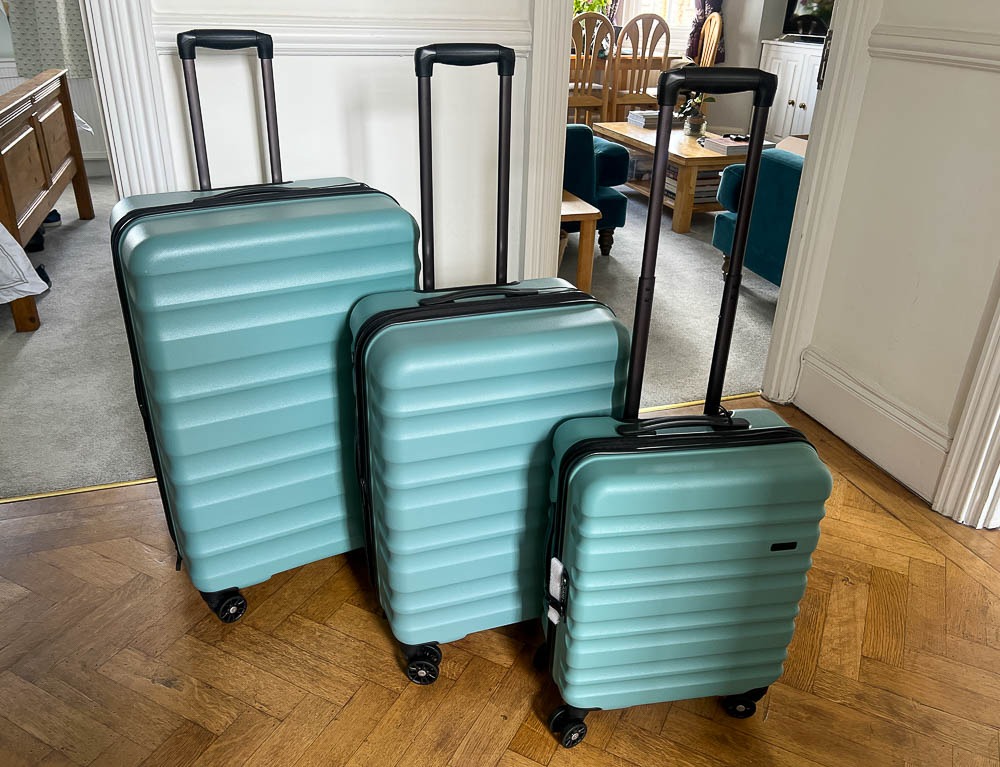
Dad’s apartment was small, but it felt more like home than anywhere I’d lived in a long time. We didn’t stay there for long, though. Over the next few months, I watched in amazement as Dad’s hard work paid off.
His business took off, and it seemed like every week he had good news—a new contract, a big client, or plans to expand. Within a year, we were looking at houses in some of the best neighborhoods in the city.
The house we finally chose was incredible—two stories of modern design with huge windows and a backyard that looked like it belonged in a magazine. My room was bigger than our entire old apartment.
Dad worked long hours managing his growing business, and I threw myself into creating a real home for us. I learned to cook, planted a vegetable garden in the backyard, and kept the house spotless. For the first time in years, life felt stable and happy.
I transferred to a prestigious private school, and on my 18th birthday, Dad surprised me with something that took my breath away—a brand-new luxury SUV. “Now you can drive yourself to school in style,” he said, smiling as he handed me the keys. “And maybe run some errands for your old man.”
As I adjusted to this new life, I thought about Mom less and less. She never reached out, and I didn’t try to contact her either. The wounds she’d left were too fresh, and I was determined to move forward, leaving the pain behind.

Years passed, and before I knew it, I was graduating from college with honors. As I stood on the stage holding my diploma, I scanned the crowd for Dad. He was there, smiling proudly, and for a moment, I felt like the luckiest person alive. This was what it felt like to be truly loved.
After the ceremony, Dad pulled me aside, his grin wider than I’d ever seen. “I have something for you,” he said, handing me a small box. Inside was a key. “It’s for your new apartment in the city center. Consider it a graduation gift.” Tears welled up as I hugged him tightly. “Thank you, Dad, for everything.”
Life after college felt like a dream. My career was thriving, I had a gorgeous apartment in the city, and weekly dinners with Dad became a cherished routine. Everything seemed perfect. Until it wasn’t.
The news came out of nowhere, like a lightning bolt on a clear day. Dad was sick—cancer. Advanced. The doctor’s words blurred into medical jargon, but the message was clear. It was serious.
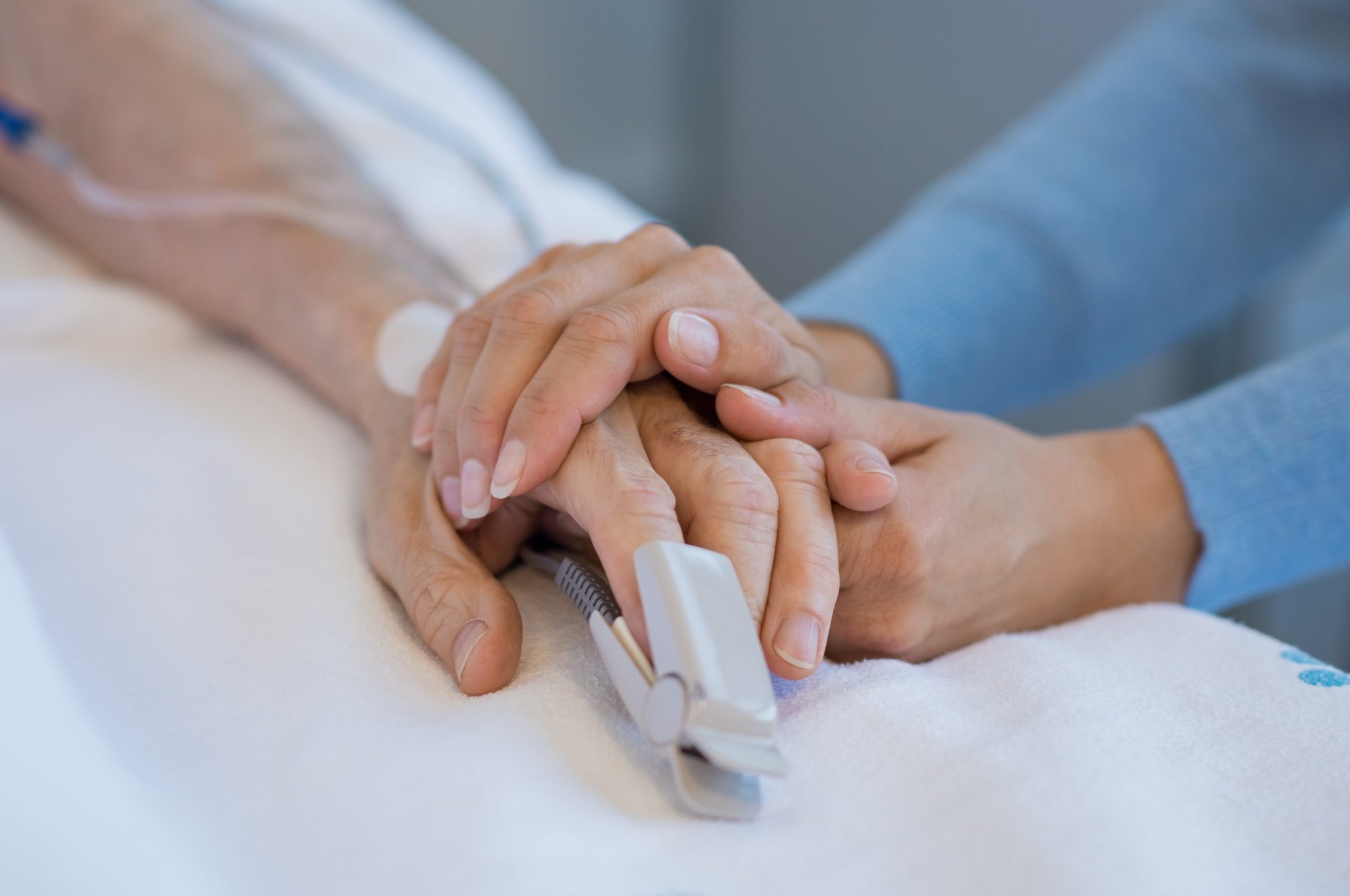
From that moment, my world revolved around saving Dad. I took a leave from work and moved back into his house to care for him. Every day was a battle of hope and despair. I researched treatments, talked to specialists, and even explored alternative therapies.
For every good day, when Dad felt strong enough to sit outside or share a meal, there were three bad days filled with pain and exhaustion from treatments.
One evening, after helping him back to bed, he turned to me with a serious expression. “Cheryl,” he said softly, his voice barely a whisper. “I need you to promise me something.”
I nodded, the lump in my throat making it impossible to speak. “Promise me you’ll live your life,” he said. “Really live it. Don’t let this hold you back.”
I wanted to tell him he’d be fine, that we’d get through this, but we both knew it wasn’t true. So instead, I squeezed his hand and whispered, “I promise, Dad.”
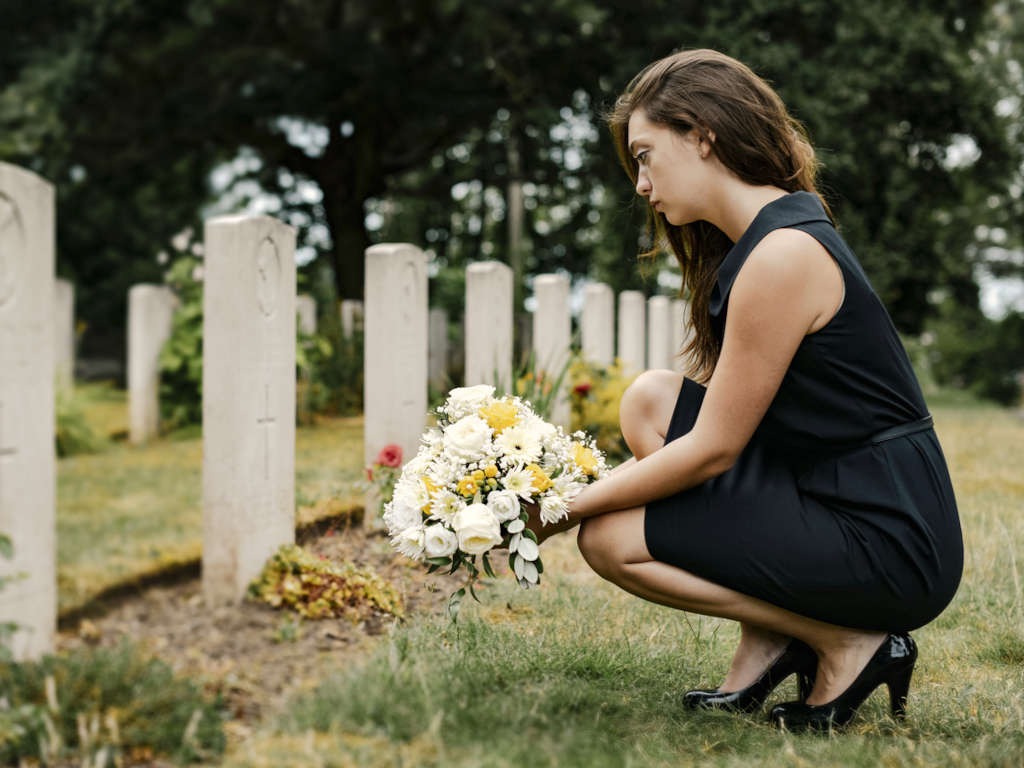
Three weeks later, he passed away. I was holding his hand, telling him how much I loved him when he took his last breath. The days after were a blur. I moved through the motions of arranging the funeral, numb from grief.
There were flowers to choose from, an obituary to write, and a casket to select. It felt surreal like I was planning something for someone else.
At the funeral home, while deciding on the music for the service, my phone buzzed. The call was from an unknown number. I hesitated before answering.
“Hello?” “Cheryl, it’s… it’s your mother.” The sound of her voice nearly made me drop the phone. After all these years of silence, she was calling now?
“What do you want?” I asked, my voice cold.
“I heard about Harold,” she said softly. “I’m so sorry, sweetie. I’d like to help with the funeral arrangements.”
I wanted to hang up, to tell her to leave me alone. But I was exhausted and overwhelmed, and a small part of me—a part I thought I had buried—longed for comfort. Against my better judgment, I said, “Okay. You can help.”
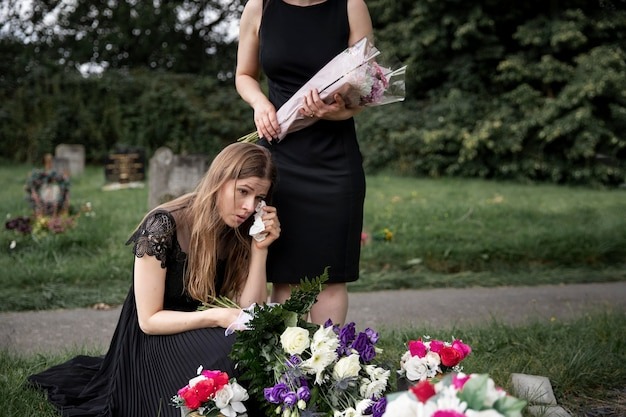
Mom arrived at the funeral home later that afternoon, accompanied by my half-brother, Brian. He was fifteen now, tall and awkward, with a shy demeanor that reminded me of a younger version of myself.
I watched as Mom fussed over him, straightening his tie and smoothing his hair. It stung to see her shower him with the care and attention I had never received.
“What do you need me to do?” she asked briskly, avoiding eye contact.
Despite my hesitation, I assigned her some tasks: managing the catering, arranging the flowers, and handling the endless stream of condolences. To my surprise, she was actually helpful. For the first time in years, I saw her acting like a capable adult instead of the dramatic, manipulative woman I remembered.
The funeral was a haze of grief. I stood by Dad’s casket, numb, as a parade of strangers offered their sympathies. Mom stayed close, occasionally placing a hand on my arm as if to comfort me. Her touch felt strange, almost foreign, after so many years of absence.
When the service ended, Mom approached me again. “Cheryl,” she began hesitantly, “I know this might not be the right time, but… I’d like to stay in touch. Maybe we could have coffee sometime?”
I stared at her, searching for hidden motives. This was the same woman who had made my childhood a battlefield of manipulation and neglect. But now, with Dad gone, she was the only family I had left. Against my better judgment, I nodded. “Maybe,” I said cautiously. “I’ll think about it.”

To my surprise, Mom kept her word. In the weeks following the funeral, she called regularly. Her voice was full of concern. “How are you doing, sweetie?” she’d ask. “Do you need anything?” At first, I kept my answers short, wary of her sudden interest. But as the weight of Dad’s absence grew heavier, I found myself craving a connection—even if it was with her.
Our conversations started simple. She asked about my job, my apartment, and my friends. Over time, though, her questions began to shift. “Your father’s business,” she mentioned casually during one call. “I hope it’s not too much for you. Harold always worked so hard.”
I quickly changed the subject, instinctively guarding the truth. The reality was that I was overwhelmed. Dad had left me everything—his company, his real estate, and all his responsibilities. It was a lot to handle, and something about Mom’s sudden interest made me uneasy.
As weeks turned into months, Mom’s true intentions started to reveal themselves. Her calls became more frequent, and her subtle hints turned into outright requests. “Brian is looking at colleges,” she said one evening, her tone casual but calculated. “Tuition is so expensive these days. I don’t know how we’ll manage.”
Another time, she mentioned Jack’s work. “His company’s been struggling. The economy, you know how it is. It’s been so hard for us.”

I resisted at first, but bit by bit, her persistence wore me down. It started innocently enough—paying for Brian’s SAT prep classes or buying her a new laptop when hers broke. Then came bigger requests, like covering their rent during Jack’s “rough patch.”
Each time, she’d shower me with gratitude. “You’re an angel, Cheryl,” she’d say. “We don’t know what we’d do without you.”
Despite my better judgment, I felt a flicker of warmth each time I helped. Was this what it felt like to have a real family? To be needed and appreciated? I told myself I was doing the right thing, but deep down, I knew something wasn’t right.
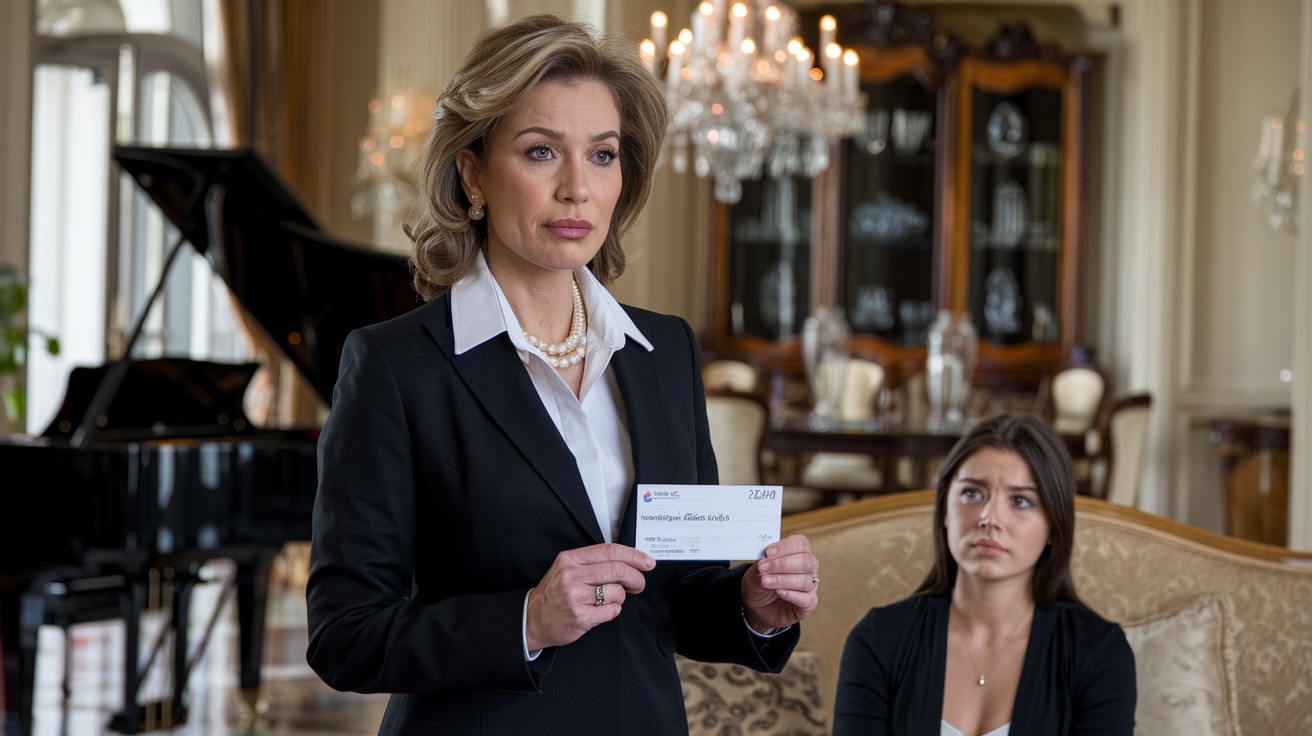
It didn’t take long for Mom’s requests to spiral out of control. What started as occasional help turned into regular, almost routine demands. The breaking point came on a bright Sunday afternoon while I was knee-deep in quarterly reports for Dad’s company. My phone rang, and I saw Mom’s name on the screen.
“Cheryl, darling,” she began, her voice syrupy sweet. “We’ve been thinking… it’s been so long since we’ve had a proper family vacation. We found this amazing package deal for a European tour. Brian’s so excited about it!”
My stomach sank. “Mom, I don’t think—”
She cut me off. “Oh, Cheryl, don’t be like that. After all we’ve been through, don’t you think we deserve a little happiness?”
Guilt and frustration warred inside me. Against my better judgment, I agreed to cover the cost. But the moment I hung up, I felt the weight of resentment pressing down on me.

It didn’t stop there. The day after they returned from their extravagant vacation, Mom was on the phone again. This time, her tone was sharper, more insistent. “Brian’s college fund,” she said, as though it were a given. “We’ll need you to set that up right away. He’s got his heart set on Bordtown University.”
Something inside me snapped. Years of manipulation, neglect, and guilt came flooding back, and I couldn’t hold it in any longer. “No,” I said firmly, my voice trembling with emotion. “No more, Mom. I’m done.”
The silence on the other end of the line was deafening. Then her tone shifted, icy and venomous. “After everything we’ve done for you, you ungrateful brat? How dare you turn your back on your family!”
I let out a bitter laugh. “Family? You mean the mother who was happy to see me leave, who made my childhood miserable? I’ve had enough, Mom.”
Her next words were filled with venom. “You’re just like your father. Selfish and coldhearted.”
I shot back, “Thank God for that. At least he loved me.”
The call ended abruptly, leaving me shaking with anger and relief. For the first time in years, I felt like I had taken back some control.

A few weeks later, an opportunity for a month-long business trip abroad came up, and I jumped at the chance. It was the perfect escape, a chance to clear my head and distance myself from the chaos. When I returned, exhausted but eager to be back in my own space, I unlocked the door to my apartment—and froze.
Everything was wrong. My carefully chosen furniture was gone, replaced with items I didn’t recognize. A couple I had never seen before was sitting on the couch, staring at me in shock.
“Who are you?” I demanded, panic rising. “What are you doing in my apartment?”
The man stood up, looking confused. “Your apartment? We bought this place a couple of weeks ago… from a woman named Isabella.”
The world spun around me. “No,” I said, shaking my head. “There has to be a mistake. I never sold this apartment. I’ve been out of the country.”
The woman hesitated, then said, “We have all the paperwork. Maybe you should talk to your realtor.”
Stumbling out of the apartment, I felt a wave of fury and disbelief. I knew who was behind this. With trembling fingers, I dialed Mom’s number.
She answered on the second ring, her voice overly sweet. “Cheryl, how was your trip?”
“Cut the act, Mom,” I snapped. “What did you do to my apartment?”

There was a pause, followed by a cold laugh. “Oh, Cheryl,” she said, her tone mocking. “If you had just shared your money willingly, this wouldn’t have been necessary. You did this to yourself.”
Her words hit like a slap. “You sold my apartment? How could you?” My voice was shaking with anger. “I’m going to the police.”
Her tone hardened. “Go ahead. Report your own mother. Let’s see how that works out for you.”
The call ended abruptly, leaving me stunned. But her smug confidence only fueled my determination. Without hesitation, I hailed a cab and headed straight to her house.
I arrived at Mom’s house, anger and adrenaline surging through me. I pounded on the door until it swung open, revealing Jack. He looked confused and concerned. “Cheryl? What’s going on?”
I pushed past him, my voice shaking. “Where’s Isabella?”
“She’s not here,” he said, closing the door behind me. “What is this about?”

I didn’t have the energy to sugarcoat it. In a rush, I explained everything—how she had forged my signature, sold my apartment, and laughed about it when I confronted her. Jack’s face turned pale as he listened, disbelief written all over his features.
“That’s impossible,” he said, shaking his head. “We don’t need money for Brian’s education. I’ve already set up a fund for him.”
His words made my stomach drop. “You didn’t know?”
Jack didn’t respond. Instead, he rushed to his office and returned with financial statements and credit card bills. As we sifted through the paperwork, the full scope of Mom’s deceit unraveled.
She had taken out secret loans, opened multiple credit cards in Jack’s name, and spent the money on luxury items—designer clothes, spa visits, and even stays at five-star hotels. None of it had been for the family.
Jack sat down heavily, his face ashen. “I had no idea,” he said softly. “She’s been lying to both of us.”
The realization hit us both like a freight train. This wasn’t just a personal betrayal—it was outright fraud. My resolve hardened. “I’m going to the police,” I said firmly. “She can’t keep getting away with this.”
Jack nodded, his voice grim. “Do it. I’ll back you up.”

The investigation that followed was grueling but necessary. Every document we uncovered revealed more lies. Mom hadn’t just forged my signature to sell my apartment; she’d been living a double life, funding her lavish lifestyle through deception.
The case gained media attention, and soon, reporters were camped outside the courthouse. It was humiliating to have my family’s dirty laundry aired so publicly, but a part of me was relieved. Isabella’s perfect image was finally shattering.
At the trial, Mom showed no remorse. She even tried to paint herself as the victim, blaming her actions on “financial stress” and accusing me of abandoning her. But the evidence spoke louder than her excuses. The judge’s words still echo in my mind:
“Mrs. Isabella Surman, your actions show a complete disregard for the law and a betrayal of your family’s trust. I sentence you to four years in prison and order you to repay the full value of the apartment to Cheryl Surman.”

Jack filed for divorce immediately after the trial and sought full custody of Brian. “I can’t let her be around him,” he told me. “Not after what she’s done.”
As for me, I used the money from the apartment to buy a small house on the edge of the city. It was a fresh start, a space that was entirely mine. I poured myself into Dad’s business, determined to honor his legacy. The work was challenging, but it gave me purpose and helped me rebuild my confidence.
Brian and I stayed in touch. He was in college now, studying engineering with Jack’s full support. It was bittersweet, but I was glad we had some semblance of a relationship.
As for Isabella, I haven’t heard from her since the trial. I don’t know if she’s tried to reach out, and honestly, I don’t care. That chapter of my life is closed.
Looking back, I’ve learned that family isn’t just about blood—it’s about trust, respect, and love. And sometimes, walking away is the only way to find peace.
This story draws inspiration from real-life events and individuals, but it has been adapted and fictionalized for creative expression. Names, characters, and specific details have been altered to protect individuals’ privacy and to enhance the storyline. Any similarity to real persons, living or deceased, or actual events is coincidental and unintentional.

